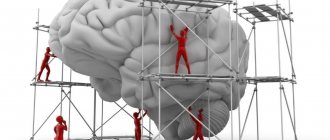Hello everybody!
Few people can boast that they have never experienced a feeling of apathy. This state is like in a song from a cartoon: I don’t want anything! I propose to talk about what apathy is in simple words.
In the morning you can smile, but by lunchtime, as they say, it’s over. The picture of life becomes gray. I don’t want to do anything, sometimes I don’t even want to move. And in the evening everything seemed to get better. Sometimes it doesn’t let go at all. It would seem that there is nothing wrong. Life is life, and whatever happens, it will pass.
That’s right, but the risk of a more serious situation developing is not small. There is a danger of mental illness. And spending part of your life in despondency and coma is a so-so prospect. This is if everything is left to chance. But we won’t allow this. And how to resist this scourge, you will learn from the article.
- How apathy differs from depression - you need to know
- And then came Her Highness Apathy
- What is apathy in simple words - 10 signs
- Reasons for Her Highness's coming
- Who needs to fear apathy?
- How can we overcome it?
- More proven methods of dealing with Her Highness
In the dictionary Dictionary of foreign words
and, pl. no, w.
A state of complete indifference, indifference, indifference. Apathetic - characterized by apathy.||Cf. ABULIA" title='ABULIA, ABULIA this, what is ABULIA, ABULIA interpretation'>ABULIA, DEPRESSION" title='DEPRESSION, DEPRESSION this, what is DEPRESSION, DEPRESSION interpretation'>DEPRESSION I (1), DYSTHYMIA" title='DISTHYMIA , DISTHYMIA is, what is DISTHYMIA, DISTHYMIA interpretation'>DISTHYMIA, PROSTATION" title='PROSTRATION, PROSTATION is, what is PROSTATION, PROSTATION interpretation'>PROSTRATION, SOPOR" title='SOPOR, SOPOR this, what is SOPOR, SOPOR interpretation '>STOPOR, STUPOR" title='STUPOR, STUPOR is what is STUPOR, STUPOR interpretation'>STUPOR.
Share the meaning of the word:
Apathy
The meaning of the word Apathy according to Efremova: Apathy - State
deep indifference, indifference.
The meaning of the word Apathy according to Ozhegov: Apathy - State
complete indifference, indifference
Apathy in the Encyclopedic Dictionary: Apathy - (from the Greek apatheia - dispassion) -..1) indifferent, indifferent attitude towards the environment; a state in which internal motivations, interests, emotional reactions are reduced or completely lost... 2) One of the basic concepts of the ethics of Stoicism, complete freedom of the soul from passions and affects. Proposed by Stilpon (Megarian school), developed by the Stoic Zenonomis Kition, Epictetus.
The meaning of the word Apathy according to the dictionary of medical terms: apathia (apathia; Greek apatheia insensibility; synonym: anormia, atimormia, painful indifference) is a disorder of the emotional-volitional sphere, manifested by indifference to oneself, surrounding persons and events, lack of desires, motives and inactivity . Synonyms for apathy: apathy see laziness
The meaning of the word Apathy according to Ushakov’s dictionary: APATHY
(apathy
is obsolete), apathy, w.
(from the Greek apatheia - insensibility). Indifference, coldness, inactivity, lethargy. Feel complete apathy towards the matter. took over me .
Be in a state of apathy.
The meaning of the word Apathy according to Dahl's dictionary: Apathy
and. Greek dispassion, insensibility, indifference, indifference, indifference, equanimity, coldness, hatefulness, inertia, lethargy, laziness, Oblomovism (from Goncharov’s story). Apathetic, apathetic, dispassionate, indifferent, inert, etc.
Definition of the word "Apathy" according to TSB: Apathy
(from the Greek aratheia - dispassion) 1) in the usual meaning of the word - an indifferent, indifferent attitude towards the environment. 2) In medicine - a painful condition, expressed in indifference, in an indifferent attitude to what is happening, in the absence of external manifestations of emotional reactions (paralysis of emotions). A. is often associated with abulia (apato-abulic syndrome) - a general decrease in mental activity. Such patients are inactive, taciturn, and lack initiative. Apato-abulic syndrome is observed in some mental illnesses, as well as in functional disorders of the nervous system. They treat the disease that caused A., and also use stimulants of nervous activity. 3) In ancient philosophy - one of the basic concepts of Stoic ethics, which consists in the requirement for the complete liberation of the soul from all passions. According to the teachings of the Stoics, “passion” is an unreasonable movement of the soul, characterized by deviation from correct judgment about good and evil; the sage must be free from passions and feelings of fear and sadness. This teaching was first developed by Stilpo, a representative of the Megarian school, and after him by Zeno (See Zeno of Elea) from Kition (4th-3rd centuries BC).
Apathetic Apathy Apatosaurus
Saving straw: how to help a loved one cope with apathy
We've figured out how to help yourself. But what to do if your close friend or relative shows obvious signs of apathy? I really want to help, but it’s not clear how to do it.
Unfortunately, here the situation is even more complicated. Until a person realizes the severity of his condition and wants to get out of it, it is impossible to help him. The help that you try to force on him will only cause resistance.
But there are still several ways you can try. I can’t guarantee the result, because everything depends on the person himself.
Don't burden a person with moralizing lectures
The worst thing you can do for a person in apathy is to constantly drip on his brain. He already knows that not everything is all right with him. By reminding him of this, you open an open wound and cause even greater despondency.
Charge him with your energy and positivity
I wrote a little higher that communicating with enthusiastic, energetic people helps to get out of apathy. Be that person for your friend. Always be energetic and positive around him, try to involve him in some kind of activity, and demonstrate your love of life as often as possible.
There is a chance that your friend will be imbued with your optimism and will slowly begin to climb out of his swamp.
Don't solve all your problems for him
Helping loved ones is the duty of a decent citizen. But you can do a disservice to a person in apathy. He may like the role of a weak and sick person, and he will be stuck in it forever.
I'll tell you an incident from my life. I had a friend who, at the age of 35, was laid off and lost his job. The search for a new job dragged on for months. All this time the guy led an idle and lazy life. And in the end I earned apathy. When they agreed to hire him, it turned out that he was no longer able to work. He quit after not even two weeks.
But he needed to live on something, and the man got deeply into loans. A couple of years later, his debt exceeded a million rubles, and the bailiffs threatened to seize the apartment. Relatives came to the aid of the poor fellow and paid off the debt in the hope that he would come to his senses. But this did not happen, and a few years later they had to chip in again.
The story is sad and complex. Not helping him would mean leaving the person alone with a serious problem. But then, perhaps, having gone through severe stress, he could return to normal life and make up for lost time.
Consult a competent doctor
If other alarming symptoms are present, try to persuade the person to visit a specialized doctor and, if necessary, undergo treatment. At the same time, take all organizational issues upon yourself: find a competent specialist and make an appointment with a friend. This is not the kind of help that can do harm.
More proven methods of dealing with Her Highness
Let's look at what else can improve our lives.
- Rest. Sometimes all a person needs is a thorough rest. Not 2-3 days, but three or four weeks. As far away from work and home as possible. So that no thoughts about the office or unpleasant events. Someone will need to be alone and do something exciting so that bad thoughts don’t come to mind. As they say, change the stop, shake yourself up. Fishing, hunting, hiking in the mountains. Anything that helps relax the nervous system.
- Daily regime . Chronic lack of sleep, nightly vigils at the computer, insomnia are not our friends. Sleep should be 7-8 hours. Lights out preferably at 22-23 hours. We often underestimate the restorative powers of good sleep. At first, following a regimen may seem like an unnecessary strain. In fact, by leading a measured lifestyle, a person gets more done and has fewer reasons to worry about time pressure. Another minus factor is the appearance of apathy.
- Strong physical activity. Physical activity in moderation magically brings us back to life. Just in moderation. Exercising every day or running until you drop will only do harm. You can start simply with walking and morning exercises. Yoga, ping-pong, swimming pool, cycling are good options.
- Auto-training and meditative practices. Of course, all these events are without any mystical nonsense. It would be nice, of course, to take a few lessons from a good master. But you can also learn a couple of relaxing and calming simple techniques on your own. There are no problems with information on the Internet now.
- Reasonable nutrition. I mean full-fledged, with all sorts of salads, vegetables and fruits. Balanced in proteins, fats and carbohydrates. The energy of our body, and therefore its resistance to stress, depends on the composition of the food we eat.
- If possible, remove all small annoying moments . We are not always clearly aware of how many little things can infuriate us. We're used to it. But these factors accumulate and, as they say, quantity can develop into quality. Hello, apathy, or something like that.
An annoying colleague - avoid communication or, if not possible, reduce it to a minimum. Do not communicate with a friend if such contact no longer brings pleasure, but only infuriates. If something irritates a loved one, then discuss it with him, do not tolerate it in silence. Yes, we can correct something. But if you have tried these life improvements, but vile apathy does not want to give up, then do not delay. You need to see a neuropsychiatrist.
Reasons for Her Highness's coming
To eliminate this condition, we need to identify the main causes of its occurrence. This will be the first step towards getting rid of apathy.
- Emotional burnout . This may be fatigue from the profession, when a person works for a long time at the same, albeit favorite job. He suddenly realizes that this activity has not only ceased to bring joy, but is also unpleasant. But there is no opportunity to change the field of activity, and the person continues to suffer. Or suddenly he was interested in something for many years. I devoted all my free time to this hobby. And suddenly bam, it was cut off - not interesting. There is emptiness in my soul.
- Stress . Any strong negative event: death of a loved one, major quarrel, separation from a loved one, moving to a new uncomfortable place, betrayal of a loved one, loss of a job. This also includes minor but constant conflicts in the family or a nervous environment at work.
- Overwork. In this case, the nervous system signals to us that it is time to quit everything and rest. Even if a person does not feel tired.
- Serious illness. For many of us, even the diagnosis of some terrible disease causes stupor and shock. This is not surprising. And the very course of the disease depletes all strength. And if this is a disease of the nervous system, then the person will be exhausted both physically and mentally.
- “Side effects” from medications are not a rare occurrence and can also cause signs of apathy. These are sleeping pills, blood pressure lowering agents, and contraceptives.
Apathy and loss of strength: causes and symptoms
If we talk about chronic fatigue syndrome (CFS), it most often affects women from 25 to 40 years old, but the disease can also affect men. These are mainly people engaged in responsible work and intense intellectual activity. CFS occurs due to the development of neurosis, which is caused by inhibition of activities responsible for inhibitory processes. That is, excessive use of the resources of the human body.
How do you know if you're not just tired? CFS is a state of fatigue that does not go away with rest and lasts for more than six months. In addition to the obvious symptoms of CFS, similar to the symptoms of fatigue: apathy, depression, attacks of anger, aggression, amnesia, there is one that betrays the disease: a significant decrease in ability to work. The fact is that with chronic fatigue, you not only get tired quickly, you simply cannot work more than a few hours a day.
What other symptoms can chronic fatigue syndrome cause?
- dizziness and headache; - deterioration of immunity; frequent colds—muscle weakness, body pain; - slow reaction; - tinnitus; - decreased thinking processes; - loss of appetite;
- lethargy, apathy, drowsiness.
Fatigue can manifest itself for physiological and pathological reasons. There is nothing wrong with physiological fatigue. It is usually associated with workload, lack of sleep, jet lag, and overexcitement.
The causes of pathological fatigue are more extensive:
- psycho-emotional; - taking medications; - insomnia; - vitamin deficiency; - chronic diseases; - excess weight and eating disorders; - chronic pain; - viruses and rehabilitation after them; - sedentary lifestyle.
Many people don't even pay attention to fatigue. They consider their condition to be weakness or laziness. But sometimes these symptoms can be harbingers of serious endocrine diseases, including: problems with the thyroid gland, elevated glucose levels, impaired phosphorus-calcium metabolism, testosterone deficiency, hypercortisolism, adrenal insufficiency, decreased vitamin D, iron, and more. All of these serious illnesses can manifest as normal fatigue.
Therefore, it is very important to be attentive to your health and consult a doctor on time. Specialists at the Nearmedic clinic https://www.nrmed.ru/vrachi/ will be able to distinguish fatigue from a serious illness and prescribe you the right treatment.
Basic recommendations for restoring the body during constant fatigue:
Rest. Watching a positive film, reading a book, knitting, the main thing is a quiet pastime that will not cause a surge of emotions.
Sport. A healthy lifestyle helps solve many health problems. Moderate physical activity will keep your body toned and your thoughts in order. Of course, you should exclude alcohol and cigarettes.
Dream. Get a healthy eight hours of sleep in a room with the curtains drawn. It is very important to take care of your sleep, because in most cases it is sleep disturbances that lead to fatigue.
Massage, exercise therapy, manual therapy, acupuncture, hydrotherapy. Restoring the body by any means is the main goal in getting rid of fatigue. Swimming, massages and even meditation are best.
Medicines. Doctors generally prescribe vitamins and vitamin complexes, but in severe cases it is possible to use antidepressants and daytime tranquilizers.
Psychotherapy. Help from a psychologist or psychotherapist, identifying sources of stress and eliminating sources of irritation is a very important step in the fight against fatigue.
Pay attention to your health, undergo preventive examinations on time and be treated by the best doctors at the Nearmedic clinic.











